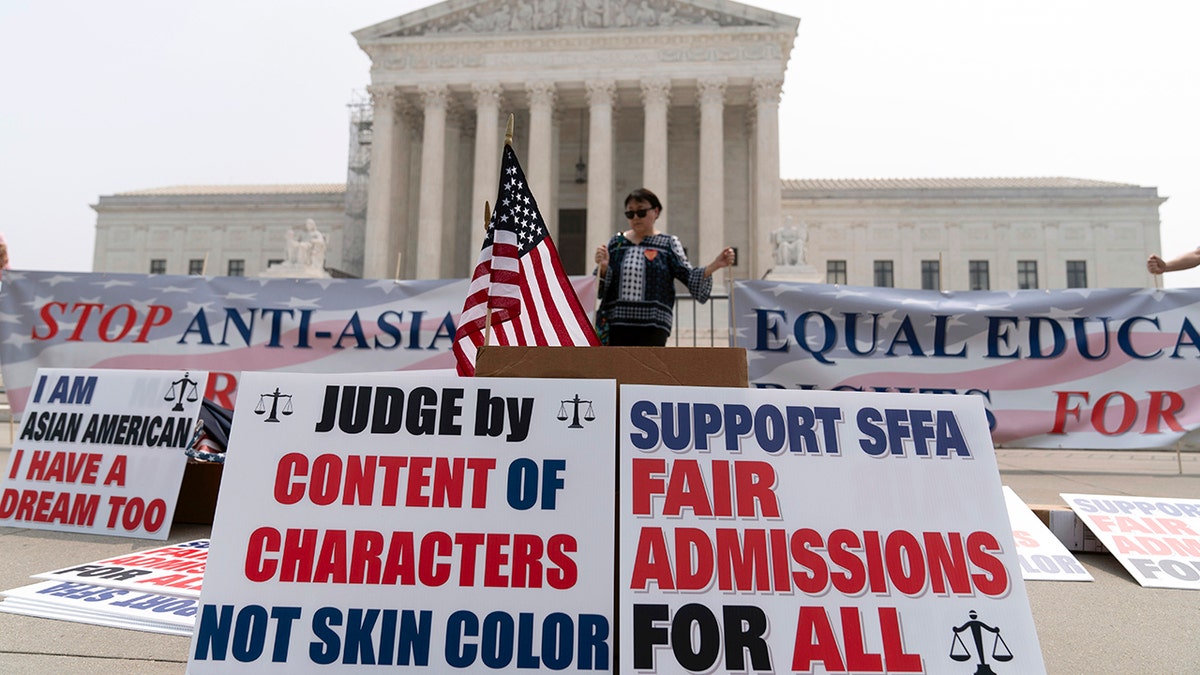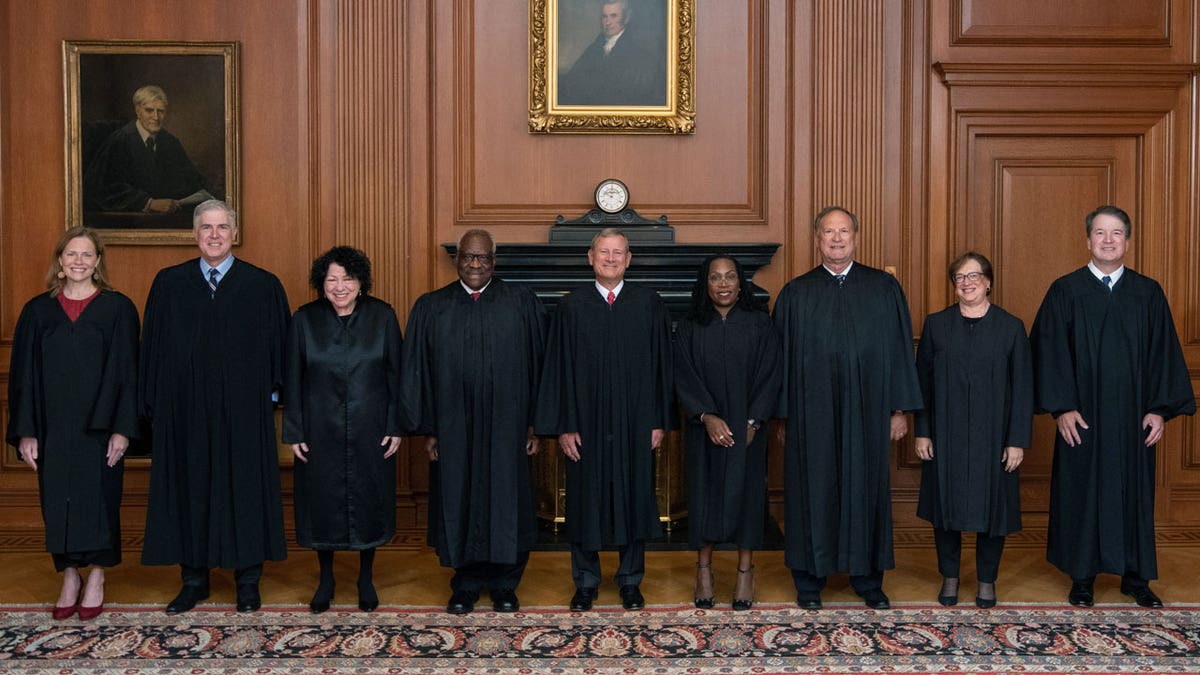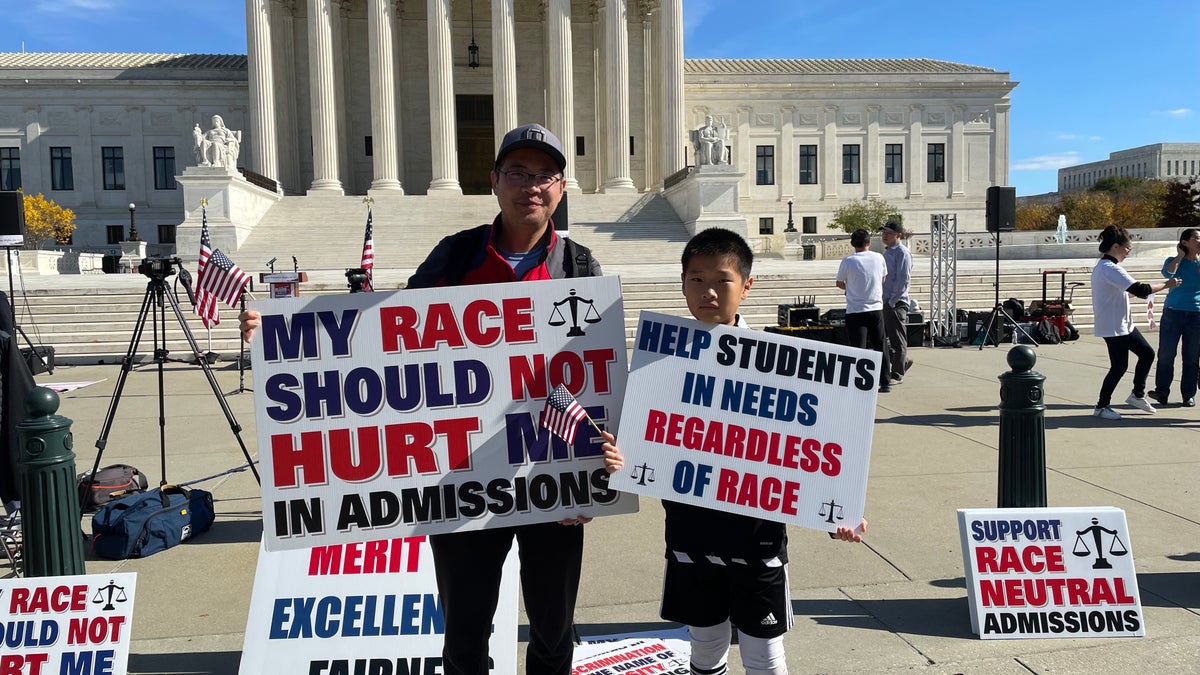Sen. Tim Scott on SCOTUS affirmative action ruling: ‘Progress in America is palpable’
Sen. Tim Scott, a 2024 presidential candidate, reacts to the Supreme Court decision striking down affirmative action and addresses the declining patriotism in America.
Decades before the Supreme Court caused an uproar last week by rejecting affirmative action in higher education, the state of Florida unilaterally banned the use of race as a factor in college admissions, potentially providing an instructive forecast of what to expect in other parts of the country moving forward.
The Supreme Court ended affirmative action in a landmark 6-3 decision last Thursday. The case combined lawsuits brought against Harvard University and the University of North Carolina with the student activist group Students for Fair Admissions, arguing that the schools' admissions programs discriminated against Asian applicants in violation of, respectively, Title VI of the Civil Rights Act and the equal protection clause of the 14th Amendment.
"A benefit to a student whose heritage or culture motivated him or her to assume a leadership role or attain a particular goal must be tied to that student's unique ability to contribute to the university," Chief Justice John Roberts wrote in the court's majority opinion.
In other words, the student must be treated based on his or her experiences as an individual — not on the basis of race.

A person protests outside the Supreme Court in Washington June 29, 2023. (AP Photo/Jose Luis Magana)
"Many universities have for too long done just the opposite," Roberts added. "And in doing so, they have concluded, wrongly, that the touchstone of an individual's identity is not challenges bested, skills built, or lessons learned but the color of their skin. Our constitutional history does not tolerate that choice."
Liberals from various media outlets and Democrats in Congress slammed the ruling as discriminatory, with some commentators attacking Asian Americans as tools of White people and even White supremacists themselves.
Many Republicans expressed support for the Supreme Court's decision, including Florida Gov. and 2024 presidential candidate Ron DeSantis, who touted the Sunshine State's own approach to affirmative action when asked about the ruling.
"Florida was one of the first states in the nation to ban race and gender preferences in college admissions. We are proud to have a system based on merit instead of woke politics," a DeSantis spokesperson told local ABC affiliate WPBF 25.
The Florida Board of Governors, the governing body for the State University System of Florida that includes all public universities in the state, also praised the decision, similarly noting the decision from years ago to prohibit the use of race as a factor in college admissions.

Florida Gov. Ron DeSantis speaks as he announces a proposal for a Digital Bill of Rights Feb. 15, 2023, at Palm Beach Atlantic University in West Palm Beach, Fla. (AP Photo/Wilfredo Lee)
"The U.S. Supreme Court issued a historic ruling declaring affirmative action in college admissions unconstitutional. This decision will have no impact on the State University System of Florida," the board said in a statement.
"The Free State of Florida has not utilized affirmative action in our higher education system since the One Florida Initiative in 1999," the board added. "The State University System of Florida provides students equality of opportunity through color-blind admissions. In addition to being the No. 1 state in the nation for higher education, as ranked by U.S. News and World Report since 2017, Florida also has one of the most diverse systems in the country. Florida is proof that diversity can be achieved without affirmative action."
NPR REPORT DISMISSES ASIANS AS TOOLS OF WHITES IN AFFIRMATIVE ACTION CASE: 'OFFENSIVE GARBAGE'
In 1999, Florida Gov. Jeb Bush signed an executive order known as the "One Florida" initiative, which was billed as an effort to increase diversity in the state without using discriminatory practices.
Among other measures, the order banned "racial or gender set-asides, preferences, or quotas" in state hiring, contracting and public university admissions. Race-based university admissions were replaced with a program that guarantees admission into one of Florida's public universities for students who graduate from high school in the top 20% of their class, irrespective of their race.
According to the Florida Board of Governors' admissions regulations, all Florida universities must not include preferences based on "race [or] color" during the admissions process.

Members of the Supreme Court (L-R) associate justices Amy Coney Barrett, Neil M. Gorsuch, Sonia Sotomayor, and Clarence Thomas, Chief Justice John G. Roberts, Jr., and associate justices Ketanji Brown Jackson, Samuel A. Alito, Jr., Elena Kagan, and Brett M. Kavanaugh pose in the Justices Conference Room prior to the formal investiture ceremony of Associate Justice Ketanji Brown Jackson Sep. 30, 2022, n Washington, D.C. (Collection of the Supreme Court of the United States via Getty Images)
Overall representation of Black and Hispanic students at Florida's public universities declined relative to population in the years immediately following the implementation of One Florida, but not everywhere. Some schools, such as the University of Florida, made gains in Black and Hispanic representation. More recently, however, the gap has widened between Black and Hispanic students and their White counterparts.
Critics of One Florida and proponents of affirmative action have especially pointed to the fact that the share of Black and Hispanic college students has decreased relative to their respective populations of high school seniors.
According to data from the National Center for Education Statistics, for example, 23% of Florida public high school seniors were Black in 1999, and 18% of undergraduate university freshmen were Black. Eight years later, 22% of high school seniors were Black, but the share of freshmen had dipped to 15%, according to the Tampa Bay Times.
However, that decline was primarily driven by falling enrollment at Florida A&M University, the state's historically Black public university. At most of Florida's other public universities, the share of Black students actually increased.
For example, the University of Florida, which boasts the state's most rigorous admission standards, saw its share of Black students increase from 11% to 14% from 1999 to 2007. Meanwhile, the overall share of Black undergraduates spiked from 7% to 10%.

Activists demonstrate as the Supreme Court hears oral arguments on a pair of affirmative action cases in Washington, D.C., Oct. 31, 2022. (AP Photo/J. Scott Applewhite, File)
Some schools, such as Florida State University, experienced a slight dip in Black enrollment over the first decade in which race-conscious admissions were banned.
More recently, from 2010 to 2021, Black and Hispanic students have become more underrepresented at Florida's elite universities, according to National Center for Education Statistics data.
In the spring of 2021, 21% of seniors from Florida public high schools were Black. That fall, they made up just 10% of freshmen at one of Florida's 12 public universities.
FOOTNOTE IN SUPREME COURT’S AFFIRMATIVE ACTION RULING EXCLUDES MILITARY ACADEMIES
Proponents of affirmative action point to such trends as evidence that schools need to consider race in admissions to be fair and realize equality. Others who support the recent Supreme Court decision counter that true equality can only be found in a color-blind society, fluctuations are to be expected as par for the course and the overall result in Florida's education system undermines the notion of any form of systemic exclusion in admissions based on race.
U.S. News & World Report has ranked Florida as the No. 1 state in the country for higher education every year since 2017, including this year. Florida officials have praised their top spot as a sign of the strength of their education system, while critics downplay the result, arguing U.S. News & World Report's rankings are using flawed metrics that don't paint an accurate picture of the education landscape.
Regardless of the rankings, Florida's top-ranked university says it considers several factors when evaluating a candidate for admission, but race isn't one of them.

A fan of the University of Florida Gators watches play during the spring football Orange and Blue game April 18, 2009, at Ben Hill Griffin Stadium in Gainesville, Fla. (Al Messerschmidt/Getty Images)
MSNBC'S JOY REID ADMITS AFFIRMATIVE ACTION GOT HER INTO HARVARD
"The University of Florida adheres to non-discrimination practices in admissions, and we do not consider race as a factor in our admissions decisions," Cynthia Roldán, the school's director of strategic communications, said in a statement following the Supreme Court decision.
"We are guided by a comprehensive, holistic review process that evaluates the academic and nonacademic criteria of applicants, in addition to requirements under federal and state laws as well as the Florida Board of Governors' regulations."
In 1999, when One Florida was signed, 69% of freshmen students at the University of Florida were in the top 10% of their graduating class, according to university data and an analysis by the Tampa Bay Times. That number climbed to 82% by 2020, indicating Florida schools are becoming increasingly competitive.
Florida also plans to extend its emphasis on non-race-based admissions decisions "even further" beyond just affirmative action, according to DeSantis.
"We have eliminated 'DEI' from our public universities," DeSantis said Friday while addressing a Moms for Liberty convention in Philadelphia. "They say it's 'diversity, equity and inclusion.' But the way it's practiced, it's ideology imposed on the institution."

Protesters called for an end to race-based discrimination at the Equal Education Rights for All rally. (Fox News Digital)
Over the weekend, a new Florida law recently signed by DeSantis began taking effect that prohibits colleges and universities from spending state or federal money to promote, support or maintain programs that "advocate for" diversity, equity and inclusion [DEI]. Under the law, schools can't spend money on programs or activities that "promote or engage in political or social activism" as defined by the State Board of Education or the Board of Governors.
Florida isn't alone in banning the consideration of race in college admissions. Texas, Michigan, Washington and California are among the small number of other states that have done the same.
CLICK HERE TO GET THE FOX NEWS APP
As for California, supporters of race-conscious admissions point to studies showing the gap between the share of high school graduates who were Black and the share of college freshmen who were Black quadrupled from 1994 to 2009. Others counter by citing data indicating race-blind admissions led to higher grades and fewer dropouts at colleges and universities.
In Texas, meanwhile, Black enrollment at the University of Texas at Austin dropped significantly in 1997, when the state banned race-based criteria, according to a U.S. Commission on Civil Rights analysis.
However, that share recovered to about where it was before the ban once Texas implemented a plan similar to Florida's guaranteeing admission for high schoolers in the top 20% of their class. The Texas version guaranteed admission for the top 10% of each high school's graduating class.
According to the commission's analysis, however, admissions for Black and Hispanic students outside that 10% decreased.













































